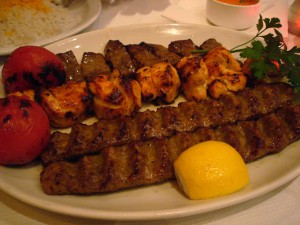‘Nushe Jun’: cultural connections through food

Image by su-lin
Food has been a major part of my life for as long as I can remember. As a child growing up in a Middle Eastern home, not a day went by where delicious, comforting, and nourishing food was not enjoyed and celebrated. I have fond memories of waking up to the smell of warm cooked breakfasts and fragrant Iranian tea, the sound of my mother frying kebabs, spooning yoghurt, and scraping at the tadig (crispy rice) stuck to bottom of the well-worn pot.
My days were doused in grape juice, brushed with pomegranate sauce, sprinkled with fresh herbs from our lush home-grown garden, filled with spice and finished with a lick of sticky fingers and remnants of khoresh (stew) dribbled down my shirt. The smell of mint sauce was a comfort, the taste of sugared zereshk (barberries) was home, and curling up to my mother’s chest meant breathing in the warm aroma of roasted walnuts, steamed rice and orange blossom I had grown to know and love.
Whilst I am both saddened and angered by the fact the kitchen was only ever occupied by women, leaving the men to gather cross-legged on the floor, biting into pumpkin seeds, a small part of me loved the women-only space. It was a place where we could sneak spoonfuls of simmering sauce into our hungry mouths, sneakily grab at the half-fried vegetables and scoop warm bread into the freshly- made eggplant dip. Enjoying food together was part of our culture, and our way of life. Spending time with people meant offering more chai (tea), cutting more meeveh (fruit), and passing around the worn box of soft Iranian dates and salted pistachios.
After filling our stomachs with thick stews, sweet rice, crisp herbs and vibrant salads, we would gather on the Persian rug and pull apart anor (pomegranate), rip at the lavoshak (fruit leather) and pick at the oloo (sour cherries) until our tongues were bright ruby red and our hands lay covered in rich juices. Tins full of pistachio nougat would be cracked open, dates dipped in fresh tahini, and sweets doused in honey, crushed nuts and rosewater would be devoured in just seconds with wide grins on our overjoyed faces. Before bed we would gather in the kitchen, picking at the crispy leftovers and scooping them into takeaway containers for lunch the next day – another chance to relive the magic.
Migrating from Iran to Australia was a huge cultural leap for my mother to take, and it is the food that has kept our community and families together for so long. Regular visits to the park for Iranian-style picnics – filled with thermoses of black tea, chicken salad and portable rice cookers – were a constant part of my young life, and I am thankful for the fact that they kept me so connected to my Middle Eastern roots. Were it not for food, my entire relationship with Iranian culture would be practically non-existent and I would not have experienced being immersed in such a loving, rich and vibrant way of living and eating.
Whilst my friends pulled out their ham and cheese sandwiches, apples and meat pies, I had a container full of rice, minted yoghurt, sweet sauce and hearty stews to look forward to. Some days, it was leftover kebab with grilled tomato, other days it was parsley and bean soup with thick noodles (aash), and, if I was lucky, I would have a bottle of sugared rosewater (golab) to get me through the hot Australian days.
Coming home was always a treat, with a plate full of fresh fruit, Persian feta, and vegetable fritters (kucku) laying on the dining table ready to be eaten. I would rejoice at the sound of my uncle turning skewers of meat on the small makeshift barbecue, and kiss my mother on the cheek as she stood in the kitchen chopping quince, stewing sour plums and sprinkling turmeric into the huge bubbling pot on the stove.
I will always be grateful for my mother watching over my shoulder, telling me when the rice is ready, and adding salt where I have forgotten. I will always remember her stepping out into our abundant garden of herbs to pick fresh parsley and mint she so lovingly tends to, and to water the newly-sprouting radishes and red chillies. I will always love the smell of a warm, spice-filled kitchen and the sound of fresh bread being torn, pickles being crunched, and plates being scraped clean with eager hands and hungry eyes. In our home, the kitchen is always open – most of the time already full of pots on the stove and rice almost ready. Come in, take off your shoes, and grab a plate. There is plenty to go round.


Its really nice to read about the way your mother guide you about the traditional dishes.old and childhood memories are really lovely and heart touching.they way you write about your life’s routine is really very touchy specially for girls.